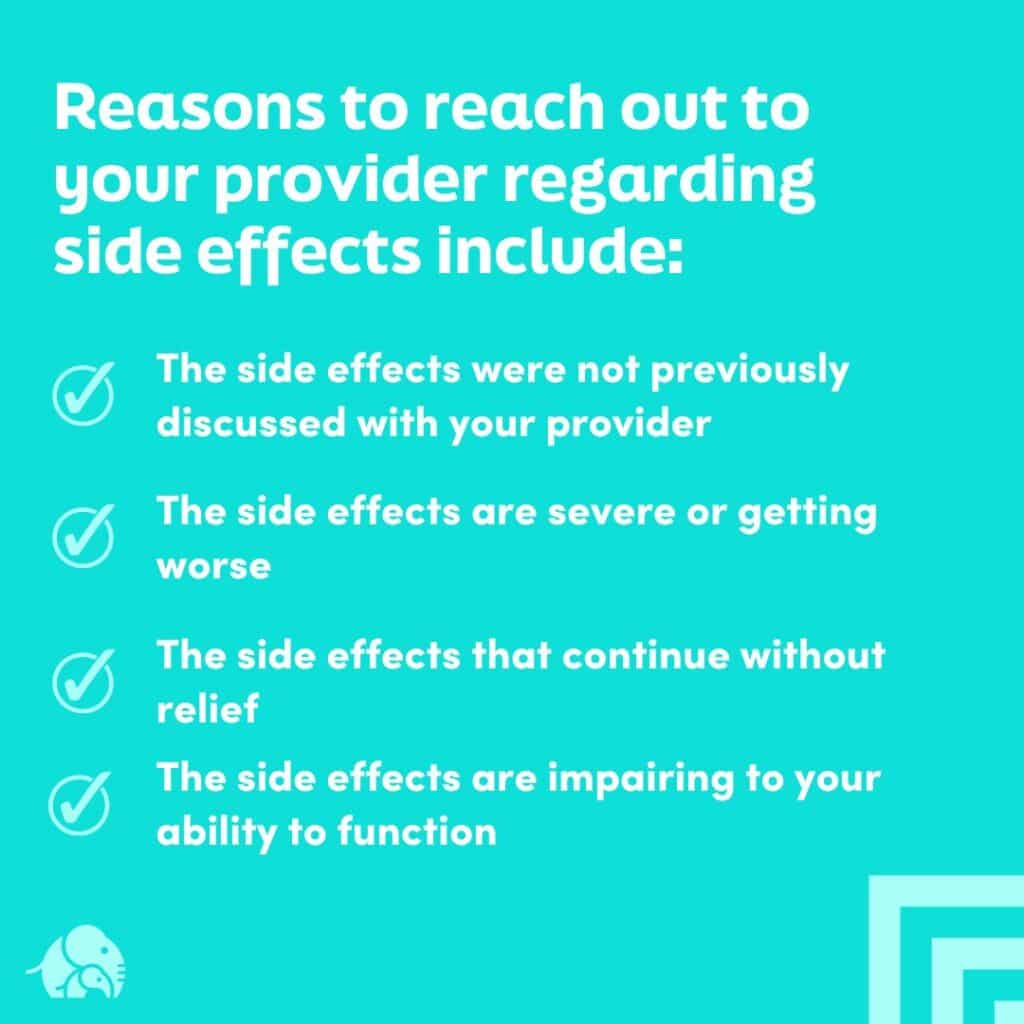Mental health is a deeply intricate and personal aspect of our lives, and finding effective treatment is crucial. While mental health medications have brought hope and relief to countless individuals, the correlation between these medications and suicidal thoughts is a topic that requires careful consideration and a sensitive approach. Understanding this complex relationship is essential to ensure the well-being of those who seek help for their mental health challenges.
It is important to recognize that medications can cause side effects that are unique to any individual and it is most important that you listen to your body when starting any new medication. There have been a number of medications that have a low chance of causing suicidal ideation and some of those are the very ones we use to treat depression. However, most people who take these medications see a significant improvement in their mood and well-being.
While this blog post begins to address the topic, it is one that is delicate and nuanced—there is no way to cover all the information or touch on individuals’ unique experiences in one article. Above all, we urge you to speak with your doctor to weigh the risk and benefits prior to starting medications, and about any changes or side-effects as you take the medications. Your provider is committed to helping you thrive, and we want to hear about any and all concerns you may have.
If you are experiencing suicidal ideation, we urge you to reach out to your doctor. We also recommend calling or texting 988 Suicide & Crisis Lifeline if you need some additional support. However, if your thoughts of suicide feel out of control or you feel unable to keep yourself safe, please call 911 or go to a hospital emergency room right away.
The Nuanced Connection
Maybe you’ve heard or read about a potential correlation between mental health medications and suicidal thoughts. There are things that complicate our understanding of this connection. One is that there have been studies that have shown there is not a connection between antidepressants and suicidal thoughts, and that after the warning was issued by the FDA the utilization of antidepressants went down and suicide rates went up. Another is that there are over 200 medications that have been connected to suicidal thoughts including antacids, hormones (including birth control), blood pressure mediations, acne medications, pain medications, and allergy medications. This goes to show that this connection is complicated, and you know your body and brain the best.
While some studies have suggested a potential association between mental health medications and suicidal thoughts, it’s essential to approach this topic with a balanced perspective, acknowledging that the relationship is nuanced. Mental health medications, including antidepressants, antipsychotics, and mood stabilizers, can be crucial tools in managing symptoms and providing relief for individuals grappling with severe mental health disorders.
This subject can be difficult to talk about, and we don’t want to deter you from seeking out medications. Instead, by opening a dialogue about these possible side effects, we hope more people can recognize warning signs and get help.

A Delicate Balance
It’s crucial to recognize that every individual’s experience with mental health medications is unique. What works for one person may not work for another. In most cases people will find the medications helpful to reduce their symptoms and improve their mood. While rare, it is possible that individuals may experience an increase in suicidal thoughts or feelings. If this happens it is important to take it seriously and reach out for help. It is important to realize that depression and other mental illness may also cause suicidal thoughts or feelings and if that happens to take them seriously as well, regardless of taking medication or not. Especially for invididuals who are new to mental health medications, it can be tempting to take anecdotal evidence from people in your life or online who have had adverse reactions to certain medications. We cannot urge you strongly enough to go to your provider with anything you may be concerned about.
Monitoring and Communication
One of the key components in managing mental health medications is close monitoring and open communication between patients and their healthcare providers. It’s imperative for individuals to work closely with their doctors to track any changes in mood, behavior, or side effects. Regular check-ins allow healthcare professionals to tailor treatment plans and adjust medications if needed. Patients should never hesitate to share their concerns or experiences, as this open dialogue is crucial in finding the right balance.
You should always leave appointments with your provider with a plan on when to follow up next, but don’t wait for that next check-in to contact them if something is off! Reasons to reach out to your provider regarding side effects include:
- You experience side effects that were not previously discussed with your provider
- You experience side effects that are severe
- You experience side effects that continue without relief
- You experience side effects that keep getting worse
- You experience side effects that are impairing to your ability to function
We can’t stress it enough: when in doubt, reach out!
Risk Factors and Warning Signs
Certain risk factors may contribute to an individual’s susceptibility to experiencing thoughts of suicide while struggling with their mental health. These can include a history of suicide attempts (though individuals may experience suicidal thoughts on medications even without a history of them), the severity of the underlying mental health disorder, and the specific medication being used. Recognizing warning signs such as increased feelings of hopelessness, extreme mood swings, or isolation is vital for both individuals and their support networks. These are general considerations and may not apply to everyone. As you work with your medication management provider, they will discuss your mental health history and other potential risk factors and take them into account when prescribing a medication that may work for you.
Holistic Approach to Mental Health
It’s essential to remember that mental health treatment is rarely confined solely to medications. A comprehensive approach can include:
- therapy
- support groups
- lifestyle changes
- self-care practices
A multi-faceted approach is often the most effective way to manage mental health challenges. Incorporating these elements into a treatment plan can provide a broader support system that complements the benefits of medication.
Read more about the synergy of mental health medications and therapy in our blog post here!
The correlation between mental health medications and suicidal thoughts is a sensitive and multifaceted topic that warrants careful consideration. While there may be instances where individuals experience an increase in these thoughts while on medication, it’s crucial to approach the subject with an open mind and an awareness of the unique experiences each person faces. By fostering open communication, closely monitoring side effects, and adopting a holistic approach to mental health, individuals and their healthcare providers can work together to navigate this complex journey and pave the way toward healing and hope.
If you are experiencing suicidal ideation after a medication change, we urge you to reach out to your doctor. We also recommend calling or texting 988 Suicide & Crisis Lifeline if you need some additional support. However, if your thoughts of suicide feel out of control or you feel unable to keep yourself safe, please call 911 or go to a hospital emergency room right away.
At Ellie, we have a qualified team of psychiatrists with immediate appointments available for medication management. Fill out our referral form using the link below.


